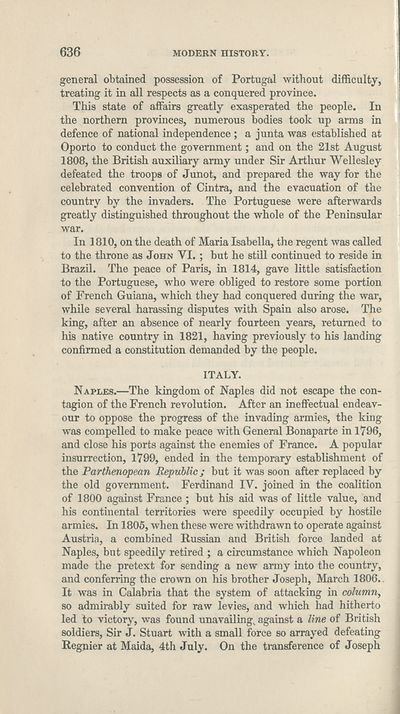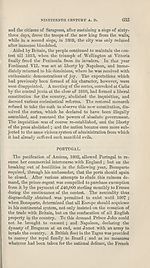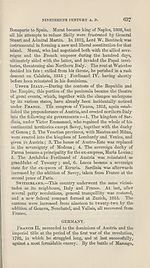Download files
Complete book:
Individual page:
Thumbnail gallery: Grid view | List view

636
MODERN HISTORY.
general obtained possession of Portugal without difficulty,
treating it in all respects as a conquered province.
This state of affairs greatly exasperated the people. In
the northern provinces, numerous bodies took up arms in
defence of national independence ; a junta was established at
Oporto to conduct the government; and on the 21st August
1808, the British auxiliary army under Sir Arthur Wellesley
defeated the troops of Junot, and prepared the way for the
celebrated convention of Cintra, and the evacuation of the
country by the invaders. The Portuguese were afterwards
greatly distinguished throughout the whole of the Peninsular
war.
In 1810, on the death of Maria Isabella, the regent was called
to the throne as John VI. ; but he still continued to reside in
Brazil. The peace of Paris, in 1814, gave little satisfaction
to the Portuguese, who were obliged to restore some portion
of French Guiana, which they had conquered during the war,
while several harassing disputes with Spain also arose. The
king, after an absence of nearly fourteen years, returned to
his native country in 1821, having previously to his landing
confirmed a constitution demanded by the people.
ITALY.
Naples.—The kingdom of Naples did not escape the con¬
tagion of the French revolution. After an ineffectual endeav¬
our to oppose the progress of the invading armies, the king
was compelled to make peace with General Bonaparte in 1796,
and close his ports against the enemies of France. A popular
insurrection, 1799, ended in the temporary establishment of
the Parthenopean Republic; but it was soon after replaced by
the old government. Ferdinand IV. joined in the coalition
of 1800 against France ; but his aid was of little value, and
his continental territories were speedily occupied by hostile
armies. In 1805, when these were withdrawn to operate against
Austria, a combined Russian and British force landed at
Naples, but speedily retired ; a circumstance which Napoleon
made the pretext for sending a new army into the country,
and conferring the crown on his brother Joseph, March 1806.
It was in Calabria that the system of attacking in column,
so admirably suited for raw levies, and which had hitherto
led to victory, was found unavailing, against a line of British
soldiers, Sir J. Stuart with a small force so arrayed defeating
Regnier at Maida, 4th July. On the transference of Joseph
MODERN HISTORY.
general obtained possession of Portugal without difficulty,
treating it in all respects as a conquered province.
This state of affairs greatly exasperated the people. In
the northern provinces, numerous bodies took up arms in
defence of national independence ; a junta was established at
Oporto to conduct the government; and on the 21st August
1808, the British auxiliary army under Sir Arthur Wellesley
defeated the troops of Junot, and prepared the way for the
celebrated convention of Cintra, and the evacuation of the
country by the invaders. The Portuguese were afterwards
greatly distinguished throughout the whole of the Peninsular
war.
In 1810, on the death of Maria Isabella, the regent was called
to the throne as John VI. ; but he still continued to reside in
Brazil. The peace of Paris, in 1814, gave little satisfaction
to the Portuguese, who were obliged to restore some portion
of French Guiana, which they had conquered during the war,
while several harassing disputes with Spain also arose. The
king, after an absence of nearly fourteen years, returned to
his native country in 1821, having previously to his landing
confirmed a constitution demanded by the people.
ITALY.
Naples.—The kingdom of Naples did not escape the con¬
tagion of the French revolution. After an ineffectual endeav¬
our to oppose the progress of the invading armies, the king
was compelled to make peace with General Bonaparte in 1796,
and close his ports against the enemies of France. A popular
insurrection, 1799, ended in the temporary establishment of
the Parthenopean Republic; but it was soon after replaced by
the old government. Ferdinand IV. joined in the coalition
of 1800 against France ; but his aid was of little value, and
his continental territories were speedily occupied by hostile
armies. In 1805, when these were withdrawn to operate against
Austria, a combined Russian and British force landed at
Naples, but speedily retired ; a circumstance which Napoleon
made the pretext for sending a new army into the country,
and conferring the crown on his brother Joseph, March 1806.
It was in Calabria that the system of attacking in column,
so admirably suited for raw levies, and which had hitherto
led to victory, was found unavailing, against a line of British
soldiers, Sir J. Stuart with a small force so arrayed defeating
Regnier at Maida, 4th July. On the transference of Joseph
Set display mode to:
![]() Universal Viewer |
Universal Viewer | ![]() Mirador |
Large image | Transcription
Mirador |
Large image | Transcription
| Antiquarian books of Scotland > Education > Elements of universal history on a new and systematic plan > (656) |
|---|
| Permanent URL | https://digital.nls.uk/127588012 |
|---|
| Description | Thousands of printed books from the Antiquarian Books of Scotland collection which dates from 1641 to the 1980s. The collection consists of 14,800 books which were published in Scotland or have a Scottish connection, e.g. through the author, printer or owner. Subjects covered include sport, education, diseases, adventure, occupations, Jacobites, politics and religion. Among the 29 languages represented are English, Gaelic, Italian, French, Russian and Swedish. |
|---|

